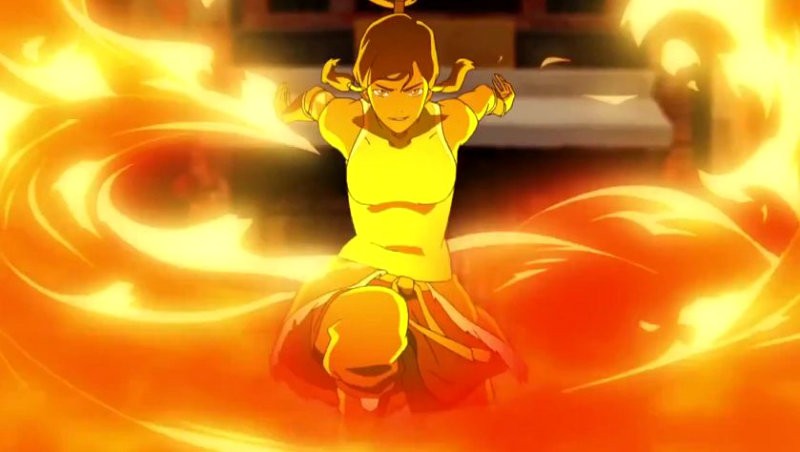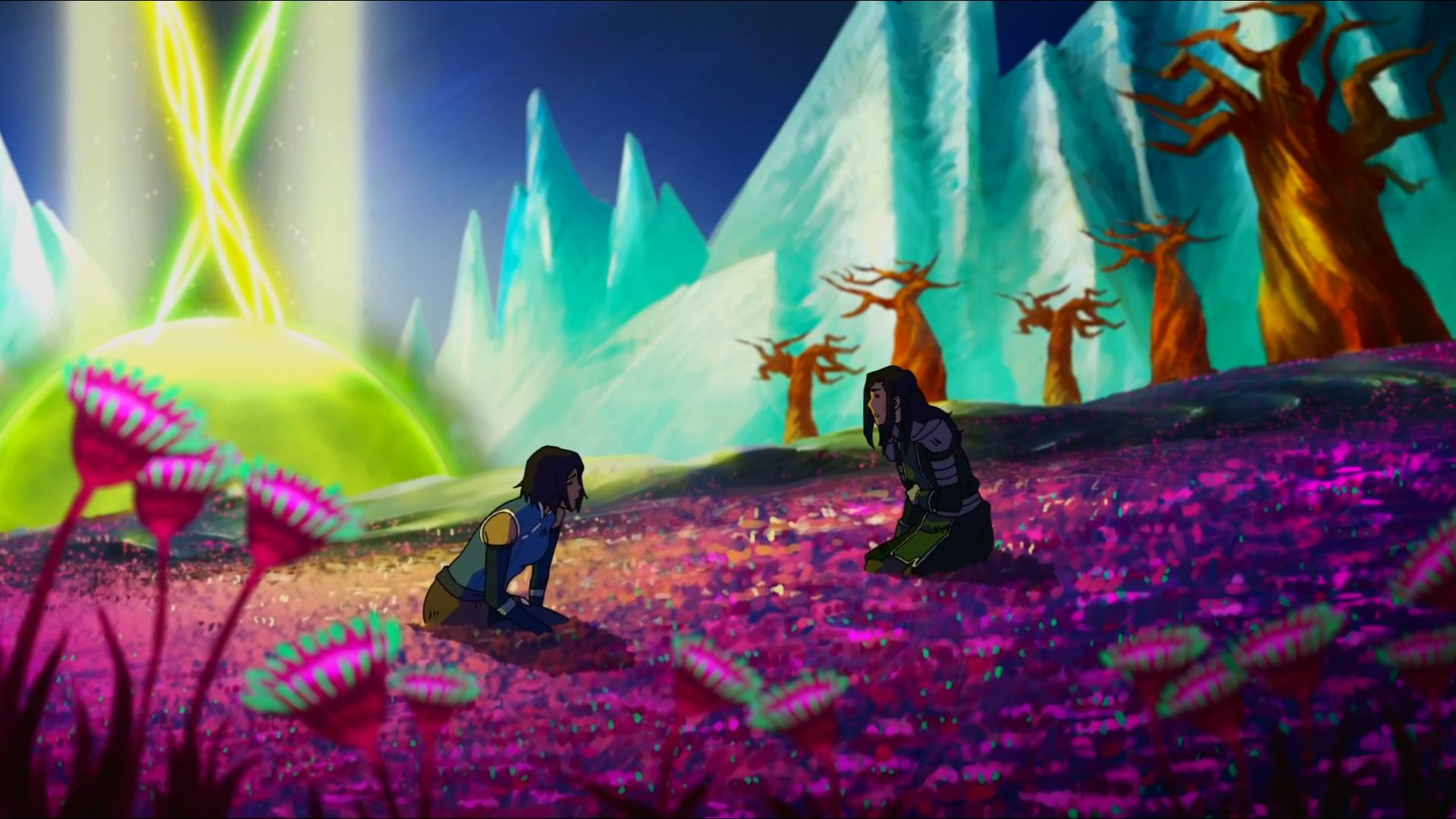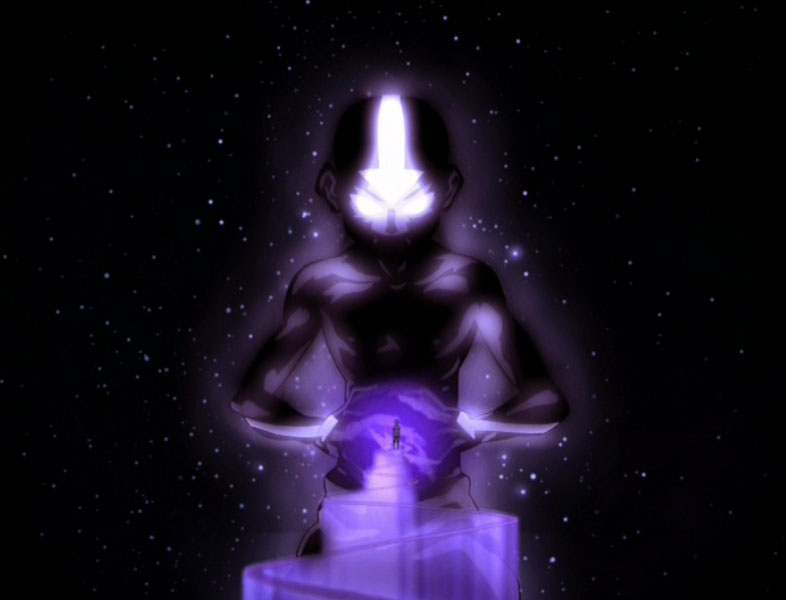Now HERE’S a question to get the
fans riled up. “Which is better”
comparisons are always tricky, but they are a bit easier when it comes to works
residing more or less within the same world, since you can compare in a much more
direct fashion how whichever shows, or books, or movies, or comics, etc. contrast within
their set, fictional universe. And as a
general rule, it’s always the older, or “original,” in a given set that comes
out on top, right? No topping the
original. Ever. Right?
Weeeeell….often, yes, but not
always. Bear with me here, I know many
of those reading- perhaps most- are smacking your keyboards (please stop if you
are) and vigorously shaking your heads (again, stop, please) yelling,
“DUUUUDE! The Last Airbender! Of
course! What the hell, man!”
If you are part of this glorious,
rowdy crowd, rest assured, I understand you.
The Last Airbender will always
carry the hallowed, nostalgic air of being “The Original” within the Avatar
universe, no matter how many shows, comics, or movies end up being made. It is a weight not to be overlooked or taken
lightly. But the tendency of nostalgia
to soften off the edges of artistic works must always be kept in the back of
one’s head when making comparisons like the one I am about to (foolishly)
attempt.
So how best to go about determining
the answer to my question? Since both of
these shows are animated, a seemingly easy point of comparison is the visual
style- which show is prettier, or more detailed, or has better-looking CGI
mixed in with the hand-drawn designs? On
a purely surface level, this would give Legend
of Korra a clear edge, since the vast differences in the budget of both
shows was apparent from day one. There
are a lot more details in the backgrounds, the characters speak and move with
motions more fluid than in TLA, and
while there is a much higher amount of CGI used, particularly in the action
scenes, it’s never excessive, and is always expertly blended in with the
hand-drawn characters and sets.
But it would certainly be churlishly
unfair to hold budget differences against TLA,
and the higher level of motion and detail in LOK does not necessarily mean the animation is better-used in the
one than in the other. Animation,
contrary to what many in the American film industry believe, is not just about
making pretty pictures- they can fall prey to being all visuals and no
substance just as much as CGI-laden action films can be. And while the designs and movements in TLA are, perhaps, simpler, they fit the
purpose, focus, and tone of the show every bit as much as the more detailed
designs or LOK. LOK
was more adult in its focus, with older characters, so the more serious style
suited it well. TLA, while just as complex and serious a story, nonetheless had a
more childish and comical tone and atmosphere, and so having a simpler style,
with backgrounds less detailed (but no less beautiful) and characters that used
sillier movements or facial expression, worked every bit as much in service of
the greater story. Preferences between
the one and the other are, of course, subject to personal taste, but from a
relatively objective standpoint it’s hard to argue that the one show was better
or worse in its use of the visual.
So much, then, for the animation
itself being a deciding factor. What
about characters? A show can’t be great
without good main characters. I’m
talking specifically about main characters, since both shows are stuffed to the
gills with fantastic smaller roles and villains, and any comparison there would
end in a complete draw. Here one might
be tempted to declare TLA the winner,
especially given the amount of hate and/or general antipathy that Mako and
Bolin seemed to draw to them. Aang,
Katara, and Sokka (and later Toph and Zuko) had an almost magical camaraderie
that just about any show would be hard-put to duplicate. And I confess, I might lean that way as
well. I didn’t really feel for Korra,
Mako, or Bolin at first (but I did for Asami- looooove Asami). They didn’t click for me for the first two
seasons. I wasn’t feeling the “New Team
Avatar vibe” until about halfway through Book 3. Part of this was because of the jumbled
writing in Book 2 (which we’ll return to in a bit), but part of it was also me
having to adjust to different faces in the same setting. Which, again, is on me, not the creators of
the show who are simply putting out what comes into their heads. Can I fault the creators of a show for
wanting to create new characters for their world? In the end, like with animation styles, this
really boils down to personal taste.
Anyone can find characters they like in both shows, and it is ultimately
purely subjective if one show happens to give you more new favorite characters
than another.
Let’s go further than just the
surface level of whether or not a character was just plain fun or interesting. Tons of shows have fun, memorable,
well-written characters. The GREAT ones
pair at least some of those characters with deep, long-term, personal story arcs,
where one or more of the people whose stories we experience undergo some great
change or shift in their lives, and have to adapt or change in reaction to
it.
The great arc of TLA, perhaps the definitive character
arc, was Zuko’s journey of redemption.
Out of all the characters present from the very first episode to the
very last, he undergoes the most dramatic shift in his thinking and worldview,
turning from a cold and vengeance-driven youth led by a misguided notion of
“honor” into someone of genuine integrity and mature wisdom, and thus reaching
a higher plane of honor than he ever before thought possible. It is one of the key elements of the show
that lifts the whole to true greatness.
Is there any comparable arc in LOK?
There are certainly none amongst the villains- each lasted only one
season, so none were provided the chance to “turn” the way Zuko was (I don’t
really count Kuvira here, for obvious reasons).
And while most of the good characters had enough screen time to be
impacted by the events of the story, none of those around from start to finish-
Tenzin, Bolin, Mako, Asami, or Lin, among others- could be said to have been altered
by the end in any sort of dramatic fashion.
Which really leaves just one arc we could compare to Zuko’s- that of
Korra herself.
As regular readers recall, I was
extremely ambivalent about Korra at first, mostly because her character
underwent a bewildering regression during the mixed middle act of Book 2 and
had been allowed to get off Scott-free at the end of Book 1. This lack of consequences was quickly
rectified though- although she doesn’t seem immediately affected by it, it is established at the end of Book 2 that
her connections to the past Avatars are forever severed. Whatever comes after this, she will have to
face it alone.
Initially, this doesn’t seem to
phase her much. She is optimistic at the
end of Book 2, and as Book 3 begins, she is more or less her punchy old
self. But things in that season snowball
rapidly, and she is soon overwhelmed by the events set in motion by the Red
Lotus, and deeply damaged physically and mentally after her battle with
Zaheer. When we get that last, tearing
shot of her at the very end of Book 3, we’re seeing more than the after-effects
of a brush with physical death. Korra
has come to question the very essence of her being; everything she believed was
enough to be the Avatar proved inadequate; her physical prowess may never
return; her already-tentative spiritual connections seem damaged beyond repair;
and with Tenzin declaring that the Air Nation would take over the task of
traveling the world to right wrongs, does it even matter if she physically
recovers? Is there any further need for
an Avatar?
The difficulties these questions
pose for Korra are truly fundamental, and the results of this play out across
the canvas of Book 4- through a journey of arduous personal redemption, Korra
remakes herself completely, not just regaining her physical strength and
health, but also fashioning for herself a level of emotional and spiritual
confidence and wisdom that we had never seen before. Ironically, despite her attainment of full
elemental control and the Avatar state at the end of Book 1 and her achievement
of metalbending in Book 3, it is only at this point that we finally see her as
a fully-realized Avatar.
This is a surprisingly subversive
twist on how stories of this nature are usually told. In most tales of an individual struggling to
attain the powers needed to realize “their destiny,” the focus is either entirely
on their development of hard, physical power (the Three Lords of Manga- Naruto, Bleach, and One Piece-
are examples of this), or with an even split between developing physical power
and reaching emotional wisdom (Luke Skywalker in Star Wars, or even Aang in TLA). Korra
reverses this- within the very first season, she attains all the needed bending
abilities to be the Avatar, something that it took Aang three full seasons to
get. But that’s not enough. And that is the point. If The
Last Airbender was fairly classical in its overall structure and story arc,
Korra is almost post-classical- we
are beyond the standard shtick of “Individual Attains Power, Achieves Destiny”
and are in the realm of, “And What Comes After That?” It is a fundamentally different kind of
journey than the one Zuko takes, but it is no less radical in how much Korra as
a person has changed by the end of the show.
How this aspect of the story is
split up and played out ties in to a final key difference between the two
shows, and one that, perhaps, offers the key to determining why some might
prefer the one to the other. The Last Airbender was intended to be a
single, grand, overarching adventure, taking place over 3 separate seasons but
with all the same main good guys, villains, and story elements, building itself
up through 61 expertly-paced episodes. The Legend of Korra is almost exactly
the opposite. Not only are there slightly
fewer episodes (52 instead of 61), they are divided up into 4 seasons instead
of 3, and in complete contrast to how TLA
was arranged, each season functions as a self-contained storyline, like an animated
HBO mini-series. So while TLA plays the slow game, carefully
putting piece after piece into place before the massive 4-part finale hits you
right between the eyes, LOK goes for
a hit-hard-and-fast rush experience with each season.
An obvious result of this is that,
when viewed in its entirety, TLA does
function better as a single, complete story.
This is partially due to the fact that, while both shows have moments or
episodes that are weaker or don’t work as well as others, those in TLA are more easily subsumed by the grandeur
of the larger tale taking place.
Conversely, in LOK, since each
individual season is meant to work as a short-yet-seamless hole, any failings
or shortfalls or mistakes in the writing become all the more apparent. A few weak episodes scattered within a season
of 20 are far less noticeable (and drag on the whole much less) than a few bumped
together in a more compact, 13-episode mini-series.
And this is where perhaps the
biggest strikes against LOK are to be
found- as unbelievably excellent as the last two seasons ended up being, there
are some major missteps in the earlier seasons that end up being sadly
impossible to ignore. I am speaking,
above all else, of the Deus ex Machina that is the very end of Book 1 and the
bizarre character regressions that Korra and Lin experience in Book 2. I am especially torn up about the ending of
Book 1. On a purely visual level, the
scene is absolutely flawless, but from a thematic and narrative standpoint, it
is fatally misplaced. Such a moment
would have been put to much better use at or towards the end of Book 2. But that is a non sequitur.
I, as well as many others, have gone
on more than a few rants about how these particularly egregious examples are
most likely the end product of massive studio mismanagement on the part of
Nickelodeon, but even if we were ever to get a leaked batch of management
e-mails confirming this to be exactly the case, re-exhuming and re-beating that
particular dead horse once more is a useless exercise. The final aired product is what it is, and
there’s nothing beneficial to be found in a debate over whether or not LOK theoretically could have worked
better had the ranks of the studio execs consist of lobotomized guinea hens. And simply absolving a
show or movie of its evident faults simply because of what could otherwise have
been is a slippery slope- anyone ready to jump up and defend the potential
positive contribution Jar Jar Binks could have made to the Star Wars
universe? No? You see my point then.
When looking at things this way, and
with all else discussed above (animation/visual design, strength of character
interaction, and presence of a defining character arc) coming out more or less
equal, it seems apparent that this is the final sticking point- TLA has a broader story intimately
connecting all 3 seasons, whereas each of LOK’s
seasons are each a sort of one-off, and at least the first two have substantial
story and character issues in the writing that are harder to ignore than
anything present in LOK. So, debate over, right? The
Last Airbender, purely on the basis of having a more cohesive, collective
plot, comes out over The Legend of Korra.
Mmmm….not so fast. Here we have to consider one, final factor-
authorial intent. And I don’t mean that
in the sense described above of, “Well, the author intended the work to be just as good, so it counts!” I mean in how Mike and Brian openly admitted
that, when they sat down to craft LOK,
they approached it from a fundamentally different angle than they had TLA.
TLA contains a more comprehensive
and more grandeur-filled, epic tale because that is what the creators wanted to
make. LOK is a collection of 1-season mini-series, with only tangential
connections between most of them because, again, that was the exact aim of the
creators of the show.
Just as there are robust debates to
be had whether or how TLA functions
as a grand, seasons-long fantasy narrative, there are plenty of debates to be
had over how well each season of LOK
works as what effectively amounts to a single animated film split up into a
dozen parts. However, since the
storytelling approach once has to take in each bring different needs to the
table, measuring the success of the one versus the success of the another is a
bit of a non-starter right from the get-to.
And once again, we find ourselves having to step back down to the
personal and subjective level. An
individual viewer will like TLA if it
fits with what they like to see in larger stories, and they will like LOK if it hits the notes they like to
see in a collection of mini-series. As
with everything else, since this aspect of how both TLA and LOK differ not so
much in terms of quality than in authorial intent and purpose, an attempt at a
direct comparison once again seems fruitless.
What, then, was the point of this
little thought exercise? Why even bother
delving into the differences between the two shows if there ultimately isn’t any
effective way to claim that one of them is objectively better than the
other?
Even though it may be fair to say
that pure objectivity doesn’t exist, I would argue that taking the time for
comparisons like this can still be immensely beneficial simply because doing so
requires us to reconsider what we expect from different types of
storytelling. By simply thinking through
in greater detail why we think the way we do, even if our minds never change,
we are left with a fuller and deeper comprehension of the why. And that is always something to be
cherished.
And as it relates to the Avatar world, it is yet another reminder
of just how wondrously diverse the experiences the shows have brought us
are. Endlessly malleable world like this
one, or the Star Wars or Star Trek universes, are some of the greatest
cultural gemstones to come out of human creativity over the past few generations,
and by reinforcing for ourselves and for others just what makes them so special
will only strengthen their influence and staying power. Of which I stand wholeheartedly in
favor.
This concludes by multiple-post
look-back at the wonderful Avatar
world that, for over a decade now, has come to mean so much to each of us, and
will no doubt continue to do so years and years to come. I can’t wait to see what comes next.
-Noah
Franc
**For
Part 1 of Avatar Month, click here
**For
Part 2 of Avatar Month, click here
**For
Part 3 of Avatar Month, click here
**For
Part 4 of Avatar Month, click here
**For
Part 5 of Avatar Month, click here






